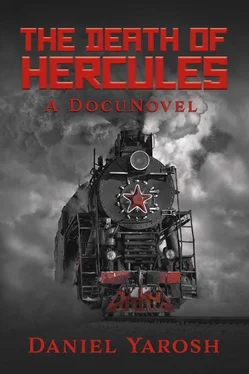The beer halls, bistros and brothels of central Lille had been kept busy during the War years by carousing German officers who used the old textile town for leave because the Allies wouldn’t bomb it. Now that the French had regained the city, the vices were the same, but the sinners felt less guilty about it. The Shertok brothers careened down the narrow streets, recklessly rounded the corners while their noisy bike startled the Sunday afternoon strollers. On their way they turned down rue Princesse, and passed the modest house at number 9, owned by a patriotic and devoutly Catholic family. There, 28 years earlier almost to the day, Charles de Gaulle had been born. No house in Lille was happier that day when the Shertok brothers passed by, crowded onto the groaning motorcycle, because a cable had arrived from the French High Command of General Pètain reporting that Charles, who had been captured by the Germans during the carnage at the Battle of Verdun, was alive.
They finally reached the most crowded section, with soldiers and civilians lining the streets, and for no particular reason Julius pulled the bike up in front of Cafe Maroilles and killed the engine. Then with a shrug to his brothers he climbed down, and Max and Saul followed. As they entered, a few French infantrymen, leaning against the cafe wall with beers in their hands, muttered the usual insults tossed between rival squads even in victory. Neither Saul nor Julius showed any concern. Max, who already had a working vocabulary of French and German to go along with his Yiddish, Russian and English, shot back a look of proud defiance that fit only the face of a cocky 23-year-old in uniform, and looked silly anywhere else.
They took a table by the corner, intentionally away from the other patrons, and ordered the house cheese Maroilles and beer from the stout matron of the bar. The cafe was dark and musty in the late afternoon light, and the rays of sun created spotlights through the broken wooden shutter slats. Those light beams fell on many faces covered by white cotton face masks strapped over their mouths and noses, which they briefly lifted to sip beer and puff on cigarettes. A virulent epidemic of influenza had peaked in October and was rampant among those still weakened by war.
Between 1918 and 1919, influenza threatened the entire world population. The illness had a rapid onset, but most had only a brief illness. However, one-fifth fell into pneumonia. A mild wave of the disease struck in the US in the Spring of 1918, and this was followed by a second wave starting in Africa and Russia in the Fall. By the time the brothers met in Lille the epidemic in Europe was severe. Half a world away in India, influenza killed 5 million, 2% of the population. Now no one was safe from this scourge piled onto the slaughter in the trenches. Just among American soldiers in Europe, 70,000 became ill and one-third of those died. Around the world that winter of 1918, more than 20 million perished from the virus.
Before their beers could arrive, two young working girls in flimsy silk dresses sauntered to their table. They did not wear masks, but one wore a mask strapped over each breast. She smiled back as the brothers smirked at her display of resistance. “American soldiers?” the first one asked in accented English.
Julius was quick, “Yes, indeed, honey.” He winked.
Saul waved them away. “Not now. Maybe later.”
Max followed, “Yeah, maybe later.”
The matron arrived and gave the girls a disappointed stare as she put the beers and cheese on the old, deep grained and scratched wood table.
“So, when do you ship home?” Julius asked Max and Saul over the top of his beer stein.
Max shrugged. “They said some were going home right away but there was a chance that a few of us would be with the General Staff when they took Berlin. Boy, I’d like to see the day when Old Blackjack has those Prussian bastards kiss his horse’s…”
“You’re not going with Blackjack,” Julius pounded the table and shook his head. “You’re going home with us.” He turned to Saul. “And you?”
“They don’t tell us nothing. That damn mule knows more than me and he’ll probably go first.” Max and Julius smiled at Saul and they all drank from their beers.
**********
What Julius didn’t say was that he was anxious to get home and get on with their life plan. Beginning six years earlier, Julius, Saul and Max were each in turn packed up by their father Shneer-Solomon Shertok, and against the wishes of their mother Ethel, sent off to America.
Shneer-Solomon lived with his family in Kherson and ran a coal business along the Dnieper River. Kherson was on the Black Sea coast at the mouth of the river, just east of the bigger city Nikolayev and the much larger city of Odessa. The cities of Kherson and Nikolayev in Southern Ukraine were founded by Prince Grigory Potemkin in 1789, and for more than 100 years the region was a major Imperial Russian Navy headquarters. When the Nikolayev port was opened to commerce in the 1860s, it quickly became the third largest port in Russia, after St. Petersburg and Odessa, and commerce flourished. By decree of the Tsar, Jews were allowed to live only on the west side of the river, and they flocked to Kherson on the west bank to provide support for the shipping and trading that sprang up. Shneer-Solomon bought a barge built in the Nikolayev shipyards, and shipped coal mined from the nearby Donets Coal Basin and wheat from the Ukrainian prairie upstream to local merchants at stops all along the Dnieper River. He even speculated in wheat futures. He built his business to 12 boats, including 2 tugboats to maneuver the larger barges into his riverside dock and coal yard.
Shneer-Solomon was a firm, fair-minded father given to bouts of anxiety and agitation. He had bright red hair and beard and striking light blue eyes. He dressed formally but viewed himself as progressive and often argued with the rabbi on politics and morals. His wife Ethel was an attractive woman with honey brown hair kept tied up in a traditional Jewish tichel . She had a reputation as wise and good natured, which helped to keep Shneer-Solomon on an even keel. She was a traditional mother but treated each child according to his or her personality. Despite her husband’s business success, she kept a cow and sold the milk for discretionary money, which she distributed in jars for each child. She taught her two oldest daughters, Clara and Manya, how to set a beautiful table with candles for Friday night Shabbos . As young boys, Shneer-Solomon’s sons helped him secure the canvas covers to the barges, load the provisions, and push off the boats into the Dnieper River. They loved the brackish water, the smell of salt in the sea air, and the way their father ordered around the rough seamen and burly dock workers. Shneer-Solomon prospered along with the Jews of Kherson, who comprised about one-third of the population at the turn of the 20th century.
Shneer-Solomon conveyed confidence, even with a bit of a swagger, belying his inner worries. He contributed to the synagogue and especially to the establishment of a technical gymnasium, a training school which was a progressive concept not well received by many of the traditional Jewish leaders. After starting up, the school was funded by a meat tax that local Jews paid the Russian Empire to keep the schools open. His three sons, Julius, Saul and Max, each received a free and high-quality practical education in mechanics, accounting, geography, Russian and German.
But the climate in Russia for Jews was fast deteriorating with the reactionary Tsar Nicholas on the throne. In retribution for peasant revolts against taxes and military conscription, the Imperial Russian Army incited pogroms in Nikolayev and the surrounding towns in 1899, and many city Jews were murdered. When pogroms came again in October 1905, the Jews of Kherson were better organized and offered some resistance, but for many the rioting army soldiers destroyed everything they owned. After years of business with Russian and Ukrainian traders up and down the Dnieper River, Shneer-Solomon saw contracts lapse, former friends turn their backs on him, and dark winds of anti-Semitism from the north chill his prospects. Jews were lumped together with Anarchists and Bolsheviks, despite Shneer-Solomon’s clear business interests. At long last he lost hope that his sons could hold on to what he had built in Kherson. He felt exposed, because as a Jew he wasn’t even allowed to own the land for his coal yard. Between the unrelenting demand for rent increases and the falling demand for coal and wheat as Imperial Russia crumbled, he saw the future as bleak. Even then the Communist agitators made him fear that the change which might overthrow the Tsar and Jew-haters would be worse for the “bourgeois” like himself.
Читать дальше












